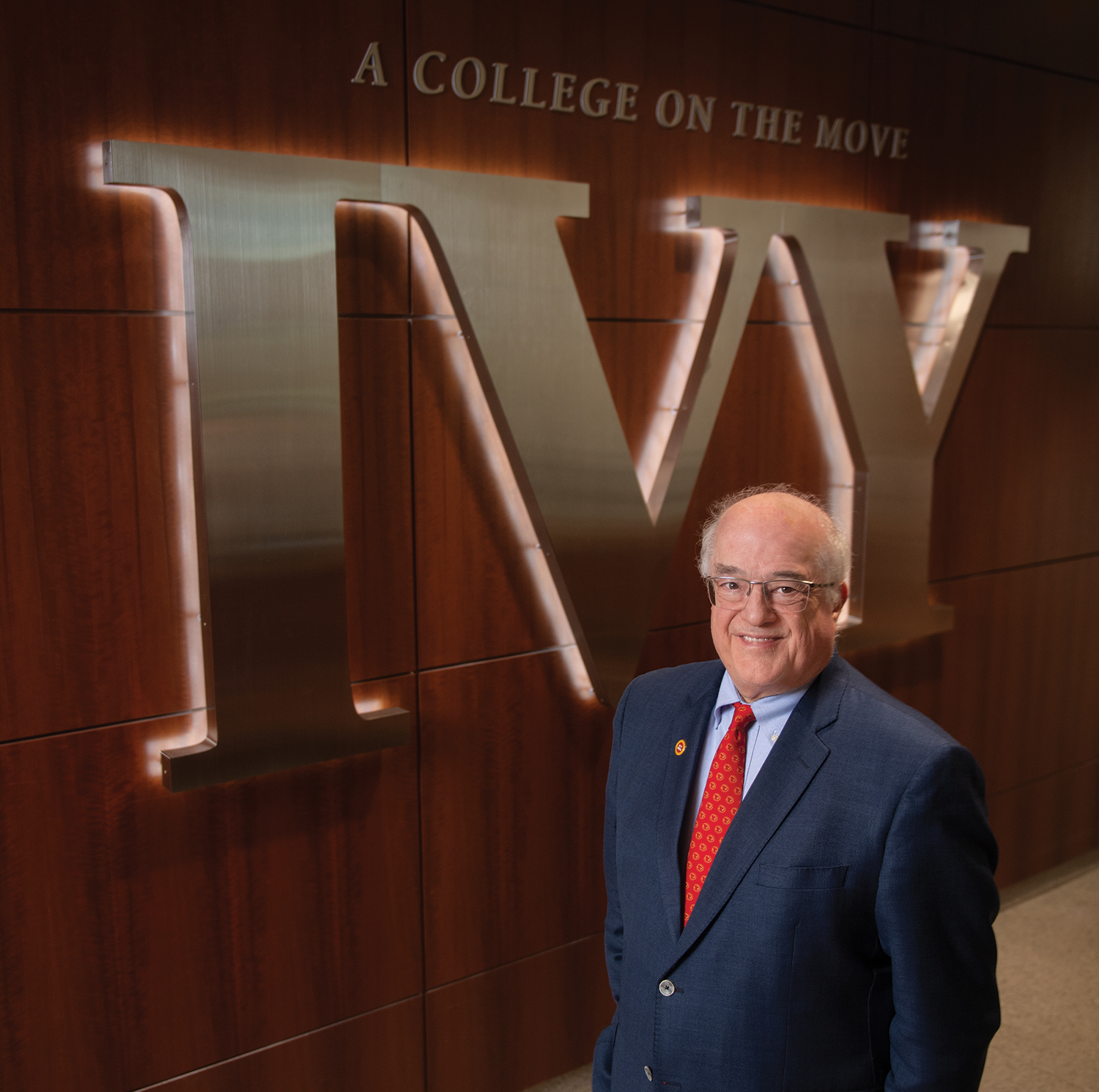David Spalding stepping down as dean of ISU’s business college

David Spalding has tried to retire twice during his professional career.
Both times, “I failed,” said Spalding, who is stepping down as dean of Iowa State University’s Ivy College of Business on June 30. “I found myself getting pulled into something instead of stepping back.”
Spalding, 71, is hopeful that he’s successful with his third attempt to slow down although “I’m not stepping back completely.”
Spalding will continue working about three days a week as ISU’s vice president of economic development and industry relations, a position he’s had for the past seven years. The position will provide Spalding with a flexible work schedule, allowing him time to travel with his wife, Marianne, he said.
Spalding became the fifth dean of ISU’s business college in August 2013. Between October 2005 and July 2013, Spalding worked at Dartmouth College in Hanover, N.H., where he was a senior vice president and senior adviser to the college’s president. Spalding worked in finance for 29 years in New York City before moving into education.
Among his accomplishments at ISU, Spalding said he’s proud that nearly 14,000 students have graduated from the business college. In addition, he said he’s proud that four assistant deans have moved on to become deans including Raj Agnihotri, who will become dean of ISU’s business college on July 1.
“I really think that is a tribute to my efforts to elevate my team and prepare them for success and take that next role,” said Spalding, ISU’s longest serving business dean.
During Spalding’s tenure as dean, enrollment in the business college grew 26.3% between fall 2013 and fall 2024. During the same period, graduate enrollment grew 99%. In addition, Spalding and his staff secured more than $177 million from donors including a $50 million gift in 2017 from Debbie and Jerry Ivy that named the college.
In the past 12 years, the business college has increased the number of undergraduate majors to 14 from eight. New majors include entrepreneurship, business analytics, human resources management, actuarial science and health care management, and a bachelor of business administration, an online program for those who started college and want to complete their degree. Also, the business college increased its number of master’s degree offerings to 11 from three.
In 2020, construction of a 45,000-square-foot addition to the Gerdin Business Building was completed.
“We built the addition with no state funding involved,” Spalding said. “We got it done with money raised from donors and some money from the college. We raised enough money that we have a $2 million maintenance fund to help us maintain the building. … I was really pleased with the way our donors stepped up to the need that we had to expand this building as we were growing our enrollment.”
The Business Record recently caught up with Spalding, whose responses to questions have been lightly edited for brevity and clarity.
You’ve accomplished a lot during your tenure as dean of ISU’s business college. What haven’t you got done that you wanted to complete?
We launched a lot of new programs but there’s still work to be done to help them mature and reach their potential. I’m going to have to hand that off to Raj and the team to get that accomplished. Most of the master’s degree programs we started were launched in the past five years. COVID had a major impact during that time. In the past couple of years, we’ve put ourselves in a position where we can really drive them toward their full potential.
What challenges will Raj Agnihotri face when he steps into the role of dean on July 1?
I think the biggest challenge he’s going to face is dealing with this upcoming enrollment cliff. Fertility [rates] in the United States began to decline in 2008. It’s going to hit higher education starting in 2026.
I read something in the Chronicle of Higher Education that said that this spring, the highest number of students ever will graduate from high school in the United States – 3.9 million. Starting next year, the number of high school graduates will begin to decline and by 2041, 3.4 million students will be graduating from high school. That’s a significant decline over a 15-year period.
That’s going to mean challenges for higher education. How do you best position yourself to operate in an environment where you are seeing a declining number of high school graduates? It’s going to be a very different atmosphere.
We’ve done some things to prepare for that. It is part of the reason why we started as many of the majors as we did. It’s one of the reasons we really tried to drive the rankings and try to best position the college to do well during a time that’s going to be more difficult from an enrollment standpoint. This is definitely a challenge that Raj and the team are going to have to successfully guide the college through.
What other challenges might the new dean face?
AI is something that we’re all still trying to figure out. I think we’ve done some things in our college that are helping to better prepare our students to deal with a world where AI is going to play an important role, but I think there’s more work that’s going to have to be done. It’s a constantly evolving story at this point in terms of exactly what AI is going to do for us and how to best optimize or take advantage of that new technology.
There are a lot of leaders who are part of the baby boomer generation who are retiring or getting ready to retire. What advice do you have for them on handing the reins of an organization to someone else?
Succession planning is one of the most important things any leader does, especially if you’re thinking you’ll be retiring in two to three years. You’ve got to think about how you’re preparing your team for that transition. Your successor is not always going to come from inside your organization. But, if you are doing the job well, you’re going to have people on your team who are ready to assume that responsibility.
Also, I think it’s helpful to have a good plan on what it is you’re going to do when you step down. Have some positive goals that you want to accomplish. In my case, my wife and I are very interested in doing more traveling and we’ve got some great travel plans lined up for the 12 months after I step down as dean.
You spent 29 years in private business. What prompted you to make the leap to higher education?
I really found working in finance to be challenging and interesting work but I reached a point where I wanted to do something with a higher mission. I’ve always believed in the transformative value of higher education. My father and mother were first-generation college graduates. Going to college really changed the trajectory of their lives. When I thought about stepping out of business, I wanted to do something that I had a passion for, and so I looked into higher education. The president of Dartmouth College, which is where I got an undergraduate degree, heard I was looking and he said, ‘Why don’t you come work for me? I need somebody to run alumni relations for us.’ I did and it’s been very rewarding. I have the same passion today for it that I did when I came into the field almost 20 years ago.
What made you decide to step away now?
I’ve done this for 12 years and it’s time for someone else to take the torch.
You mentioned you plan on traveling. Where’s the first place you’re going?
We’re going to Dublin, Ireland for the Iowa State versus Kansas State football game in August. [The teams are playing in the Aer Lingus College Football Classic.] That wasn’t going to be the first trip but as soon as it came up, and I knew I was going to be stepping back, we said, ‘Let’s go.’ If I was still going to be dean, with classes starting on the Monday right after the game, I probably would have said, ‘Not this year.’ But we jumped at the opportunity.
At a glance
Age: 71
Currently Lives: In Ames
Family: Wife, Marianne, and two adult children
Education: Bachelor’s degree from Dartmouth College; Master of Business Administration from New York University’s School of Business
Work Background: Worked in finance for 29 years in New York City including as vice chairman of the Cypress Group LLC; held various positions at Dartmouth College between October 2005 and July 2013; was named the Raisbeck Endowed Dean of Iowa State University’s college of business in August 2013; was named ISU’s vice president of economic development and industry relations in July 2018; is chair of the board of directors of both the Iowa State University Research Park and Iowa State University Research Foundation.
Contact: spalding@iastate.edu

Kathy A. Bolten
Kathy A. Bolten is a senior staff writer at Business Record. She covers real estate and development, workforce development, education, banking and finance, and housing.











